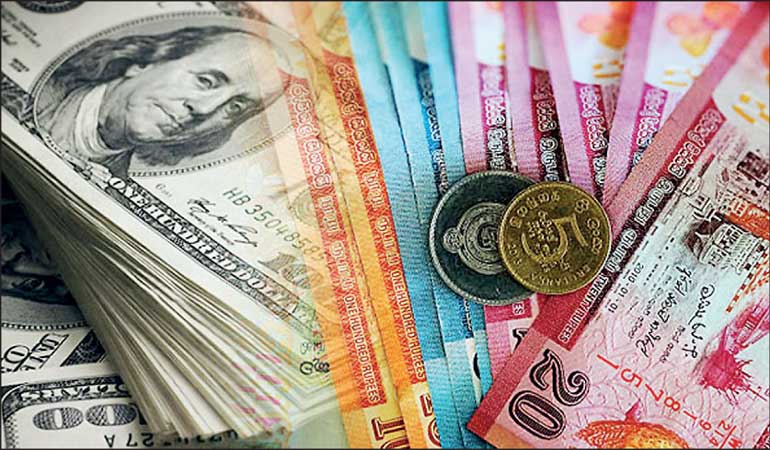Sunday Feb 15, 2026
Sunday Feb 15, 2026
Saturday, 13 August 2022 00:15 - - {{hitsCtrl.values.hits}}

 There is a centralised focus these days on the dollar crisis. In the course of addressing ways and means of resolving the issue, the attention remains much concentrated as the trusted last expedient, on possible aid and assistance from International Financial Organisations such as World Bank and the IMF. These organisations have already laid down as prerequisites of any assistance programs, the immediate need for the Government to address and effect meaningful reforms in public sector institutions, among other conditions stipulated like drawing up schemes for restructuring public debts and a sustainable debt servicing program.
There is a centralised focus these days on the dollar crisis. In the course of addressing ways and means of resolving the issue, the attention remains much concentrated as the trusted last expedient, on possible aid and assistance from International Financial Organisations such as World Bank and the IMF. These organisations have already laid down as prerequisites of any assistance programs, the immediate need for the Government to address and effect meaningful reforms in public sector institutions, among other conditions stipulated like drawing up schemes for restructuring public debts and a sustainable debt servicing program.
While the Government’s action program for debt restructuring has already started including the initiation of discussions on bilateral borrowings, the Public Sector reforms program is yet to take off. As we have experienced before, there are many obstacles that the Government has to surmount in making any effective changes in this sector. Many SOEs have continued for several decades now as heavily loss-making institutions despite specific reform programs already recommended. In the context we have to pay special attention to this area with the objective of taking measures of improvement for better results considering the need for ensuring high standards of achieving their missions and objectives.
The accumulated losses in most of the SOEs have become so burdensome even for the state to bear and continue to further aggravate their financial standing. It is imperative to examine the actual performance of some heavily profit making SOEs too, because of our previous experiences regarding some of those and certain high incongruences observed regarding their high profitability in the context of an overall dwindling economy.
As a case in-point we can refer to the State banking sector. During the last few years, they have shown very high profits in their annual balance sheets even during periods when all other business operations in the country faced severe economic hardships. This phenomenon of showing large profits in the balance sheets became a highly controversial issue during the 1990s following a special audit by two international audit firms conducted at the instigation of the World Bank in respect of Bank of Ceylon and People’s Bank. Despite the profits indicated in their annual balance sheets continuously during the preceding years, they were declared insolvent on the basis of the findings of the auditors. Both banks, which were 100% State-owned, showed deficiencies in their capital adequacies in terms of the International norms due to excess liabilities over the assets.
This revelation points to one significant notion about the usefulness of the audit process they were subjected to over a long period under the Government audit regulations. These audits failed to realise and reveal the existence of this capital shortfall hence giving an entirely wrong picture hiding the state of abnormality about the financial status of the two banks. The incumbent President Ranil Wickremesinghe himself will bear witness to this position as evidenced by his speech to parliament on 20 March 1992, (Hansard Volume 78/3, column 371…). This poses the question of the reliability of the audit reports we get in respect of Public Institutions.
When we examine the findings of the two audit reports by Arthur de Little and Booze Allen Hamilton on the two State Banks, made then, we see many similarities of the defective accounting procedures followed then and repeated now in these institutions. In fact, the magnitude of the resulting shortfall or errors exposed would be much more than what it was then. The lesson we have to learn is that if SOEs are to be effectively subjected to a reform the profitability as shown in their balance sheets should not be the only criterion to exempt them from a meaningful SOE reform program.
The other important factor to bear in mind in this regard is the heavily lossmaking institutions like the CEB, CPC and the SriLankan Airlines are all subject to Government Audit function not only periodically as an annual event, but on an ongoing daily operation basis. There are permanent Government Audit units established in these institutions with specially assigned officers. Ironically, they continue to be stationed in these lossmaking places over periods exceeding five to six years at a stretch without any transfers or replacement by successors. The accumulating losses, unfounded borrowings by them, wastage, frauds and corruption continue quite freely year after year despite the prescience of these audit officers and assigned special units. Have they contributed in any way to address these continuing irregularities?
When queried, an official from the Government Audit Department said, they are stationed in such places in terms of the transfer policy of the department which in turn is governed by regulations of the Public Service Commission. Can a shifting of an officer from one assignment to another in the same locality be objected to on grounds of government transfer policy? It is hard to believe, but may be, because many things are done at the convenience of the officer and not the job.
The audit official attached to one State bank is there for nearly six years now. So is the person attached to the CEB. The person attached to CPC is also there from about 2016. Strangely in all these places the performances and financial results are proven to be highly questionable. Lossmaking operations have continued without much questioning for years, so are the procurement irregularities that have been revealed and exposed. What is the effective role played by the auditors in these regards?
There is a big difference between an internal audit function and a government audit in a Public Institution. Not much weightage is given to internal audit findings because those responsible happen to be employees of the same institution, serving their masters. Although there are Internal Audit departments established in all SOEs, there are several inherent disadvantages associated with the system. It is only a report by an external auditor that will be accepted as independent. Because they are employees the chances are that they may be biased in reporting any faults. Generally, the internal auditors are not professional auditors and therefore their ability to detect errors will be limited.
Due to this reason as well as statutory requirements and financial regulations, the accounts of SOEs are audited by independent auditors in addition to the permanent investigatory role performed by the audit officials assigned to different SOEs. Nevertheless, as pointed out in the State bank’s case, the auditors overlook many things in their detections as well as in their reporting. Hence the erroneous or irregular operations do continue unabated causing huge losses to the Government as well as burdens to the public life. Therefore, it is necessary that the Government should focus on this aspect more seriously and address the audit function as well as the roles played by assigned audit officials. There is no reason why they should not be held responsible for certain glaring irregularities taking place in these SOEs.
We notice that at the parliamentary COPE inquiries several irregularities have been exposed and taken up for discussion. There is a feeling among the public that it is only a forum to high light because we have not seen any punitive actions being taken on highly irregular activities highlighted and even accepted by those responsible. It merely serves as a talk-shop. Auditors usually come up with the excuse that they have pointed out what they detect, although many others go down the drain without being detected. The COPE members on the other hand claim that they have no authority to impose any punitive actions. But they could very well recommend the institutions to take punitive action, recommend corrective actions and to report. This is not happening.
We have come across COPE findings widely reported in the press and media revealing shocking information about gross violations of procedures, adoption of malpractices, misuse of public funds, and wastage of huge amounts running into billions due to faulty administrative decisions. But they vanish into thin air and soon forgotten.
In any effective reform program, besides the corrective steps taken, the process of maintaining orderly administrative measures should be ensured. The best example in this regard is the situation of the State banks. The irregularities pointed out and the corrective measures taken are of no use because they have fallen to square one again due to lack of follow up. This calls for a continuing vigilant program to safeguard the smooth operation of Public Institutions.
Audit involves, in addition to examination of books and accounts and physical checking of inventories, the need to ascertain that the institutions are following the systems and also to confirm the accuracies of financial statements provided by the institutions.
Governmental audits include compliance audits done to fulfil the regulatory and statutory requirements and specific audits as defined under the laws, and other compliances.
Governmental audits also include auditing of financial statements as a duty performed under Government Statutory requirements. Auditing standards are used to conduct financial audits and performance audits of SOEs that receive government grants and awards.
Government audit requires the verification and control of public management. They are required to analyse the activity and economy of institutions to judge their efficiency, transparency and to ensure that the institutions are acting in accordance with the applicable legal provisions.
“The distrust on the part of the citizens towards the Public Administration has been very much on the increase, in the last years. The lack of control and supervision of money from public coffers, as well as public tenders, has led to serious cases of fraud and corruption.”
The society we live in demands transparency and responsible public performance. Hence a system of audit that meets these needs is a necessity requiring modern standards suited for the current economic, social and cultural environment in the context of the expectation for a new political system in the country.
Reforms and elimination of dollar shortages, frauds and corruption are all associated with a responsible audit system.